How long does it take to rank on Google? A definitive answer
Most new buyers or prospects for our SEO services always ask our digital marketing agency team a variation of this question: How long will it take for my website to rank on Google?
Search engine marketers are notorious for dropping the “it depends” phrase as the answer — which can be frustrating for someone new to SEO.
So today, I want to answer this question specifically by sharing the factors that determine how soon you’ll rank on Google, along with examples to illustrate my point. First, let me summarize what we know (backed by data).
How long does it take to rank on Google?
95% of published pages don’t rank in the top 10 in the first year. The 5% of top performers who managed to rank in the top 10 took 61 to 182 days. Websites with a stronger backlink profile tend to perform better than those with weaker ones.
The aforementioned are findings from a 2017 Ahrefs study of 2M keywords. Here’s its quick video summary:
Now, let’s look at a more indepth answer on why does it take so much of time to rank in Google.
Search engine algorithms are a black box (but…)
Around 2013, Brian Dean, an SEO blog owner, published an article titled “Google’s 200 ranking factors”, where he affirmed he’s “put together a complete list.”

The piece made waves and was cited by lots of websites. Ahrefs shows it has attracted backlinks from close to 7.5k domains (at the time of writing this post):

However, the article also had its fair share of criticism by SEO pros. Gianluca Forelli called such a list “useless and dangerous.”

Why?
Well, Google is a black box. The figure of “200” factors probably could be attributed to Google’s Matt Cutts stating that their search engine used 200 variables at PubCon in 2009:

So if there’s no definitive list, how can you make educated guesses and give yourself the best chance to rank higher?
You can focus on confirmed ranking factors. Also, use industry-standard tools like Ahrefs and Surfer SEO to study current ranking web pages for your target keyword. Let’s break this process down in the next section.
Broad Google search ranking factors you can focus on
While we don’t know Google’s exact ranking process, you can always lean on the top search results for your targeted keyword. Here are the three aspects you can analyze for a ranking page while creating your SEO strategy.
Relevance of content
It’s in the best interest of Google to satisfy its users so that they visit it more often. So any ranking page in search results has to meet the searcher’s intent.
In Google’s “How Search Works” resource, the search giant mentions “relevance of webpages” by analyzing their content as a facet of its algorithm:

Want a berth on the first page?
Then create relevant content that caters to your prospective readers’ needs and answers specific questions. This is typically clubbed under on page SEO.
For instance, within 45 days of publishing our “criminal defense attorney marketing” guide, Google has deemed it relevant for a variation of our target keyword and started testing it for the fourth spot:

We have a high domain rating (DR) and existing topical authority in the “lawyer marketing ” niche, which are important contributing factors. However, we outranked websites with a higher DR:
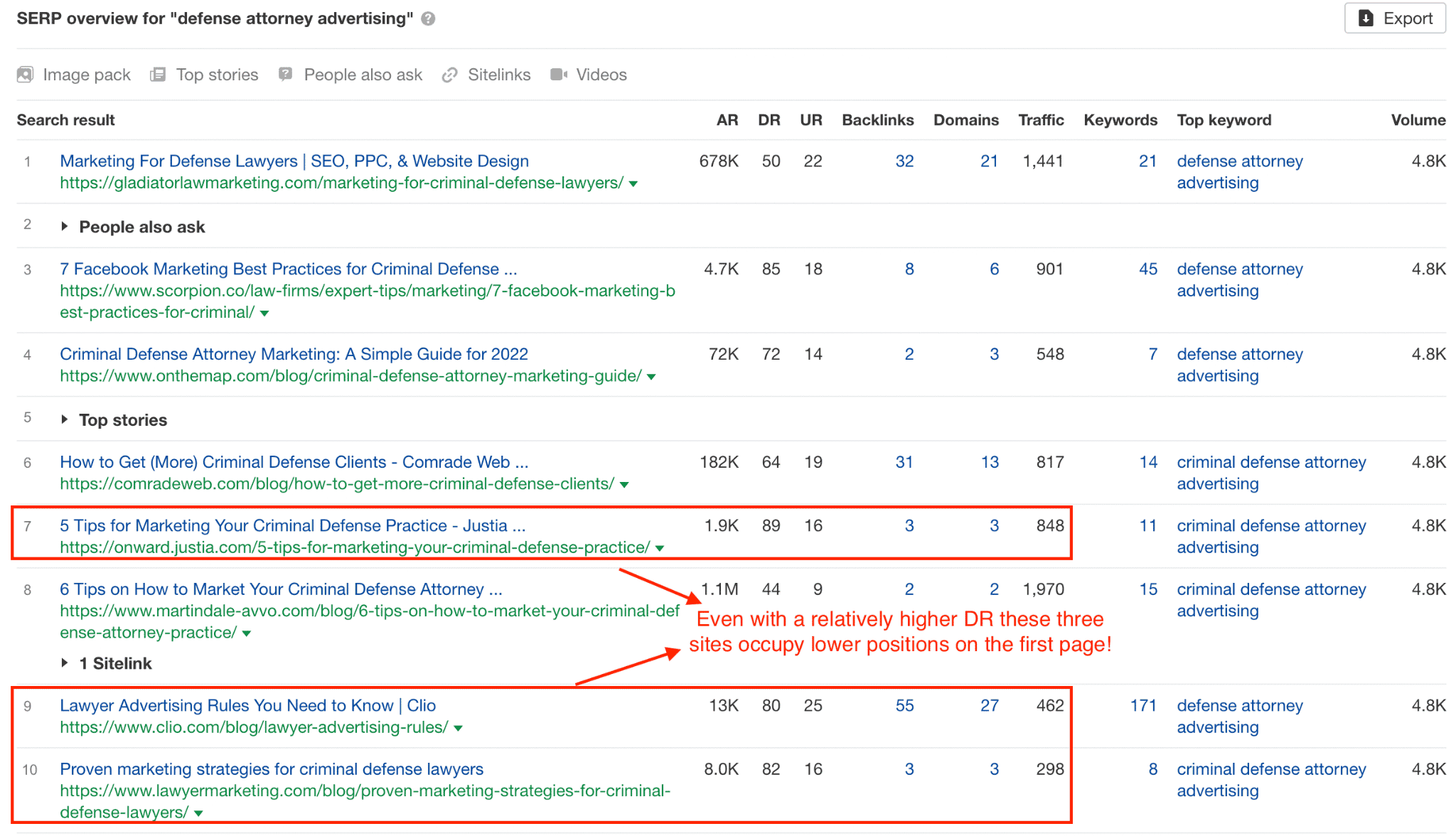
So how can you create relevant content?
Trying to cover all the subtopics for your keyword comprehensively is important. So study the content on the ranking web pages, scan their title, subheadings (H2s and H3s), usage of images and multimedia, and the like.
You can also take help from Surfer SEO for the same. It reverse engineers the top-ranking pages for your target keyword and comes with recommendations for writing your content, including recommended keyword usage, content structure, and even an overall content score.
Here’s how its evaluation looked for my “criminal defense attorney marketing” piece:

You don’t need to create content with the highest word count. Aim for brevity while getting your point across comprehensively.
PageRank (as measured by backlinks)
To measure the “value of a page” on the web, Google’s founders had devised the PageRank algorithm in 1997.
So it’s a foundational — and probably the trickiest — aspect you need to consider. Initially, Google allocated a public logarithmic score (PageRank), accessible through its toolbar. But it retired years ago.
Yet Gary IIlyes (who works for Google) confirmed that they still rely on PageRank:
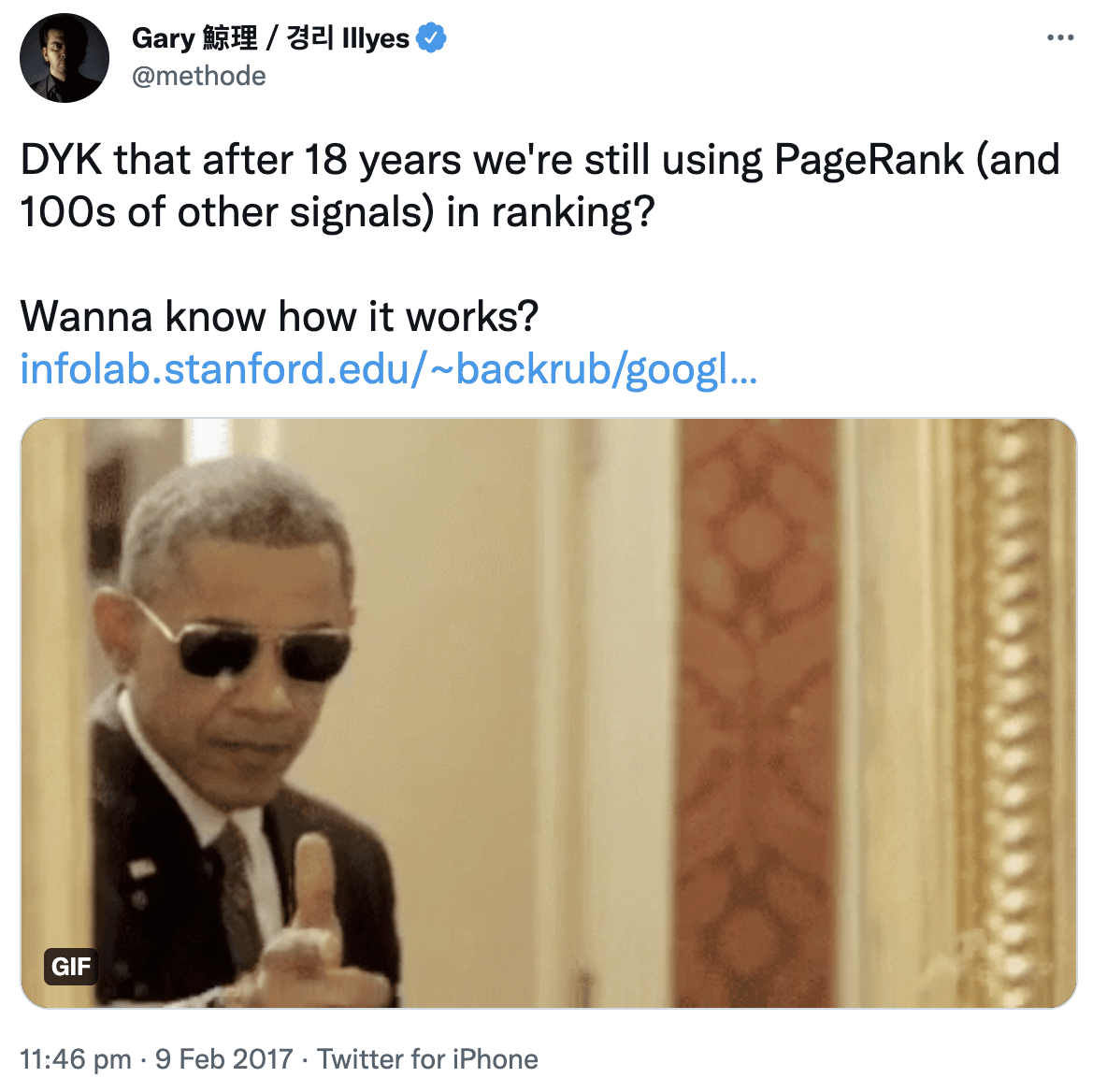
Now, nobody outside of Google knows how this algorithm works.
But SEO tools like Ahrefs offer a metric calculated similarly to Google’s algorithm for measuring the relative importance of a page and website. They are called URL rating (UR) and domain rating (DR), measured on a 100-point scale, and measure the relative strength of a page’s or website’s backlink profile.
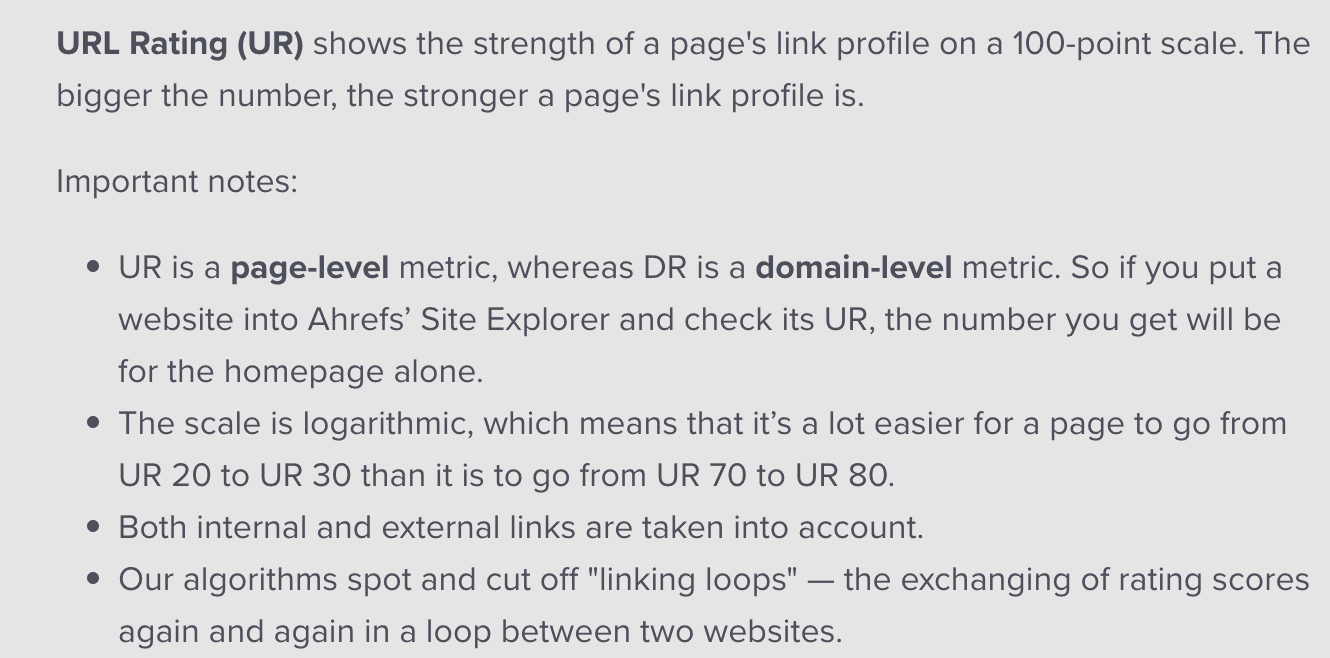
Without getting academic, let’s focus on the purpose of ranking your website for its target keywords.
- 95% of published pages didn’t have a single backlink in a limited Backlinko study of 11.8M Google search results.
- Also, the number 1 result has 3.8x links than results 2 to 10.
Simply put, to rank, you need to get backlinks to:
- your website,
- and your inner pages.
Let’s talk about them one by one.
What kind of DR is good enough?
Your niche determines this.
On The Map Marketing’s website has a DR of 72, which is pivotal to getting a decent shot for ranking in the highly competitive SEO services industry.

A lower DR might have had our content scrambling in search engine results.
However, a lower DR might suffice if you pursue personal injury SEO. Our original research on the top 50 SEO ranking personal injury law firms found that: the average domain rating (DR) for best-ranking attorney websites in Austin is 35.
Remember, high quality websites generating hundreds of thousands of visitors and a consistent pipeline of leads for their business can have a low DR.
Beyond improving your website’s authority (or domain authority), you also need to get links to the page you want to rank. An approximate measure of this is the keyword difficulty (KD) score in tools like Ahrefs.
For instance, on my website, Elite Content Marketer, there’s an article targeting the keyword “podcast hosting”, which has a keyword competition of 73 as per Ahrefs. As per the official explanation (visible below), this means I’ll need to get backlinks from a whopping 235 websites to rank in the top 10.
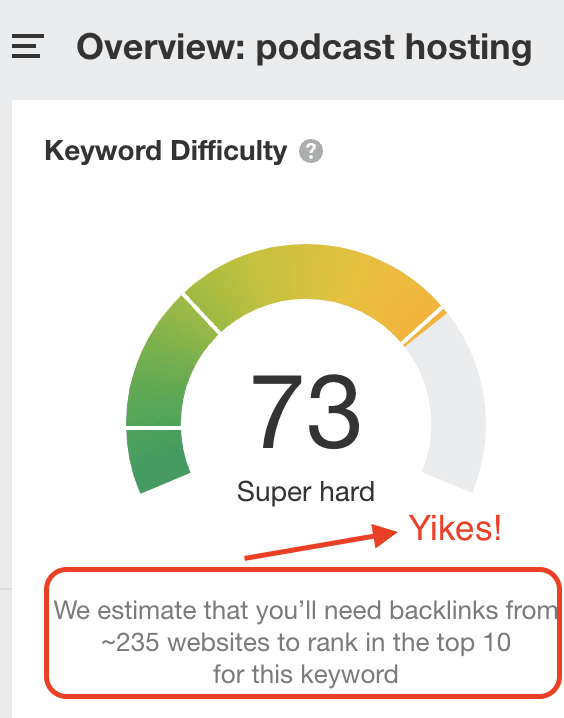
I’ve merely 59 referring domains to this page, so no wonder the article remains stuck on page 3 of Google:

As you can imagine, finding websites that can link to you then convincing their owners to add a backlink to your website is not fun. Offering money in exchange for links is officially against Google’s guidelines (though many webmasters get away with doing it). So there’s no direct benefit for a person who links to you.
Either you need to find generous website owners who are willing to perform adding a backlink as their altruistic deed of the day. Or strike mutually beneficial partnerships offering other website owners content or some service for free.
That’s why link building services by companies that rely on personalized outreach and relationships with publishers are in high demand.
What if you want to build high quality backlinks to your website yourself? Then dissect your competitors, see how they build links, and replicate their efforts. My article on legal link building can help you get started.
Website’s user experience
Google uses engagement signals to evaluate the overall experience of your website visitors. These include but are not limited to average time on page, average session duration, interactions with your site, and the like.
Indeed Google officially integrated new page experience ranking signals in its algorithm last year. This saw a new set of metrics called “Core Web Vitals” to the existing other page search signals: mobile-friendliness, HTTPS security, and intrusive interstitials.

Check out the linked piece on page experience for understanding these signals in detail!
We’ve firsthand seen the positive impact of improving the design, site speed, and overall user experience.
The Pendergrass Law Firm hired our law firm website design services. Here’s the two-month performance of their site with an outdated design. They got a total of 634 users and 611 new visitors:
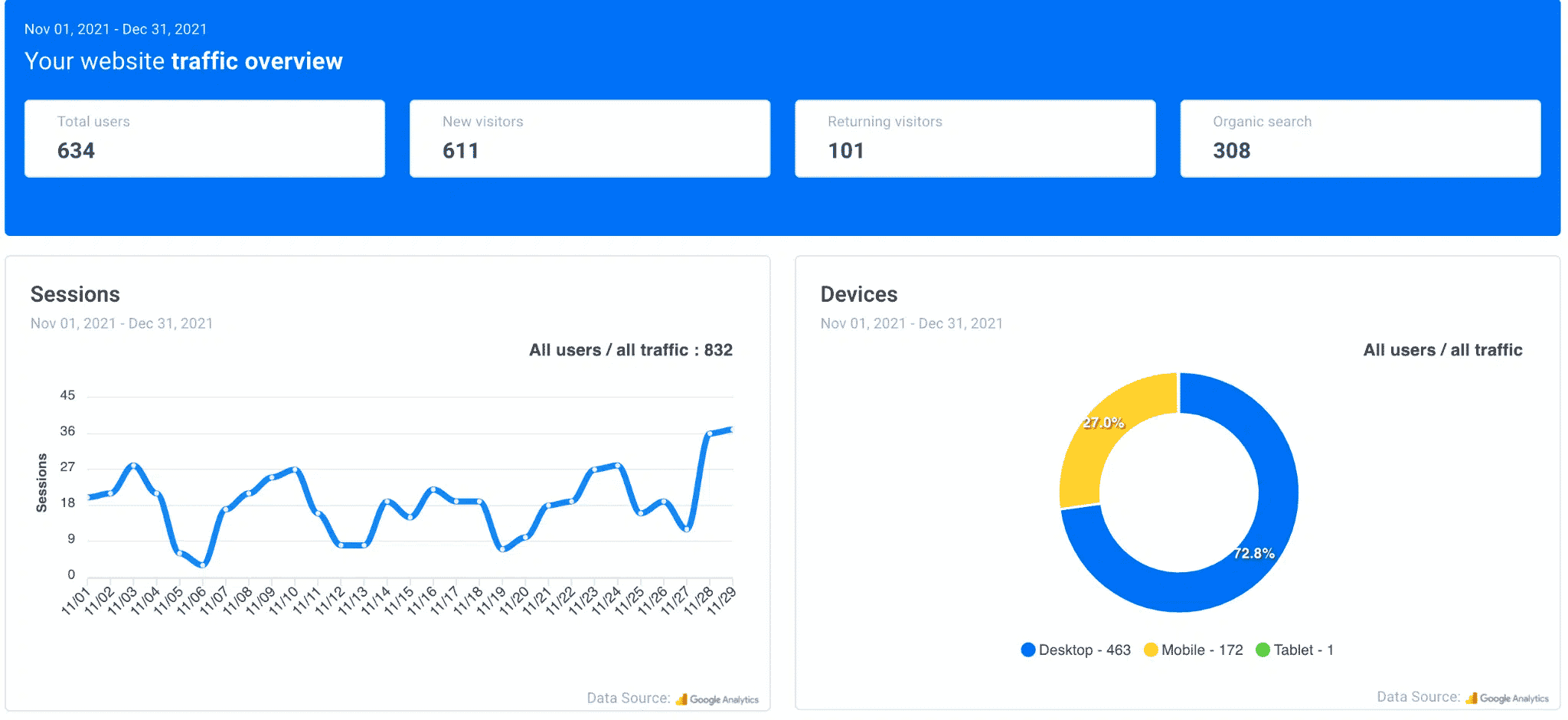
After our redesign, in the next two months, the site has touched 843 total users and 810 new visitors:
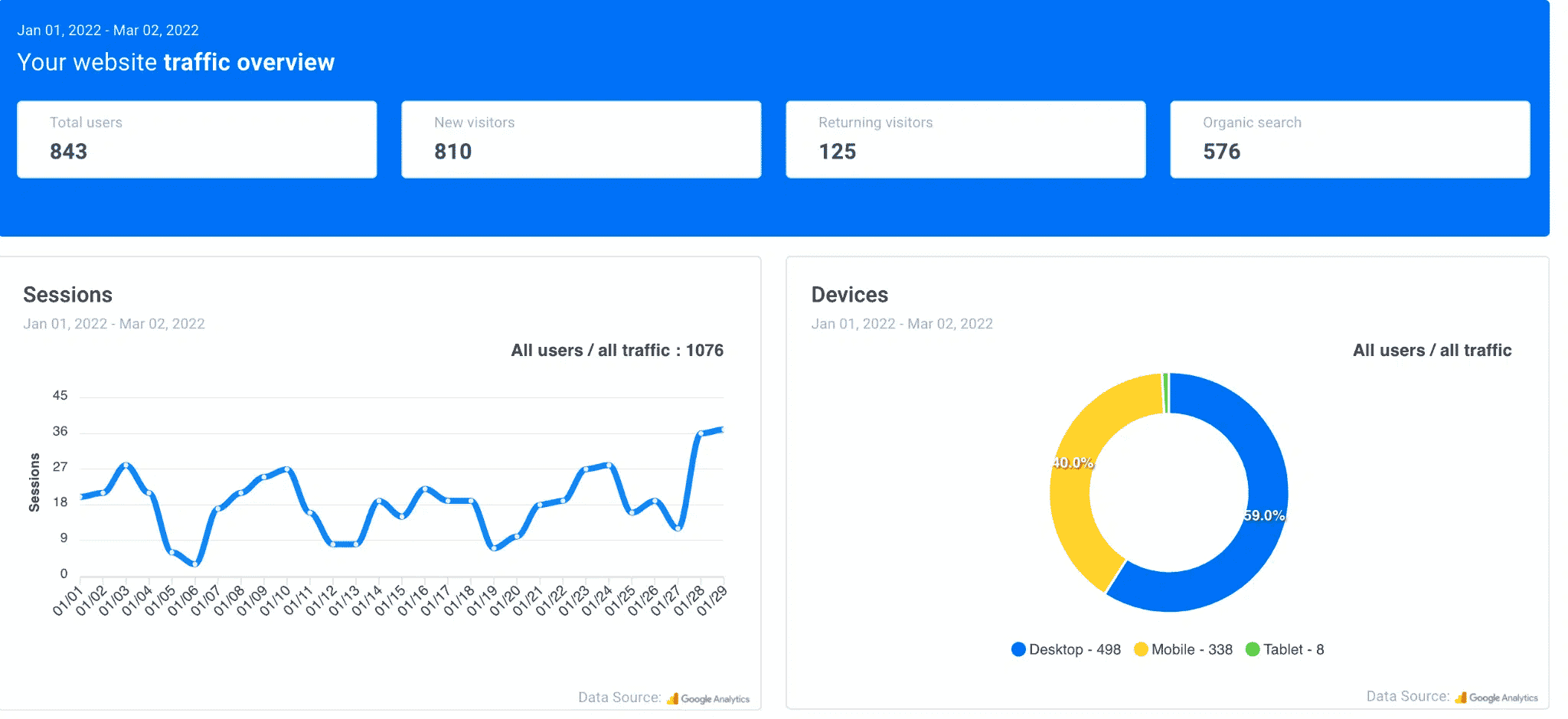
So website redesign helps your SEO, and if you plan to do it, then the checklist below can help:

How can you rank faster with a new website?
If you have a relatively new website and it’s been less than a year of working on it, you’ll need to stay patient before seeing Google ranking your website.
Why?
Since 2004, SEOs claim the presence of a “Google Sandbox”, which prevents ranking websites that are new. Don’t confuse this with the domain age. Instead, consider this as the time since your domain has actively pursued an SEO strategy.
In this period, Google evaluates your website’s quality so that it can keep its search results free of spam. Rand Fishkin proclaimed that his domain became “Sandbox free” after nine months:
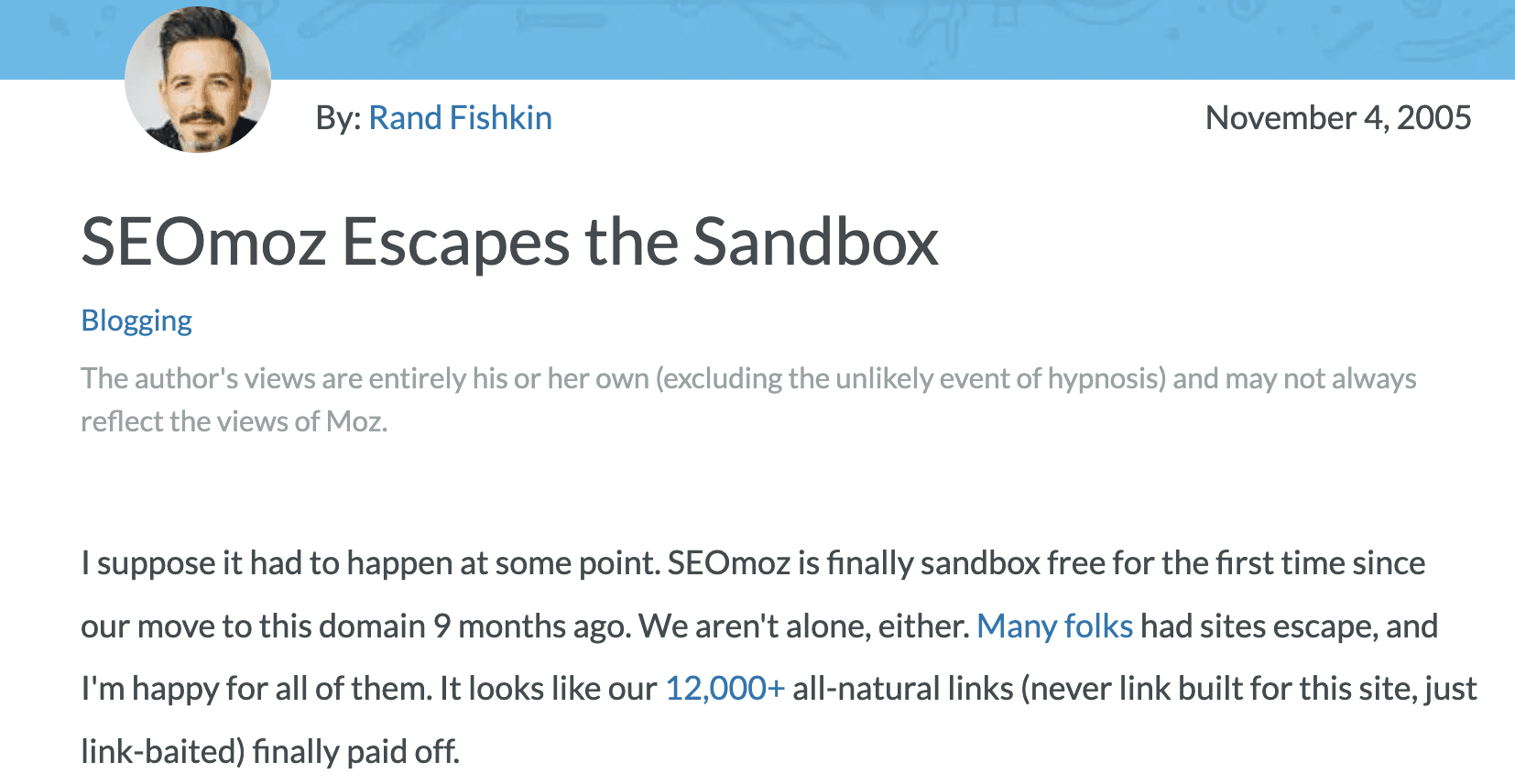
In a Google Webmaster Central office-hours hangout, John Mueller, a Webmaster Trends Analyst at Google, denies the presence of Google Sandbox. However, he goes on to say that:
“It’s always kind of tricky in the beginning when we have a new website and we don’t quite know where we should put it.”
Whatever be the name, a new website’s backlink profile is weak, and it could take some time to rank. However, here are some ways to earn the trust of search engines quicker than usual and get those swoonworthy Google rankings:
Target low competition keywords (even with a lower search volume…)
Every content piece you want to rank in Google needs to target carefully identified subjects. As you saw, competitive keywords need lots of backlinks. So leverage keyword research to identify low competition keywords that have lower search volume generally.
Keywords with a high monthly search volume tend to be too broad subjects and won’t result in targeted organic traffic, anyway. Also, a page never ranks for just one keyword that you targeted. So while considering a specific keyword, check how many keywords an average page is ranking for.
For instance, our client, Stroleny Law, ranks for close to 6k organic keywords as per Ahrefs:

However, their website has 293 indexed pages as per Ahrefs. Here’s a snapshot of the number of keywords the top 10 pages are ranking for:
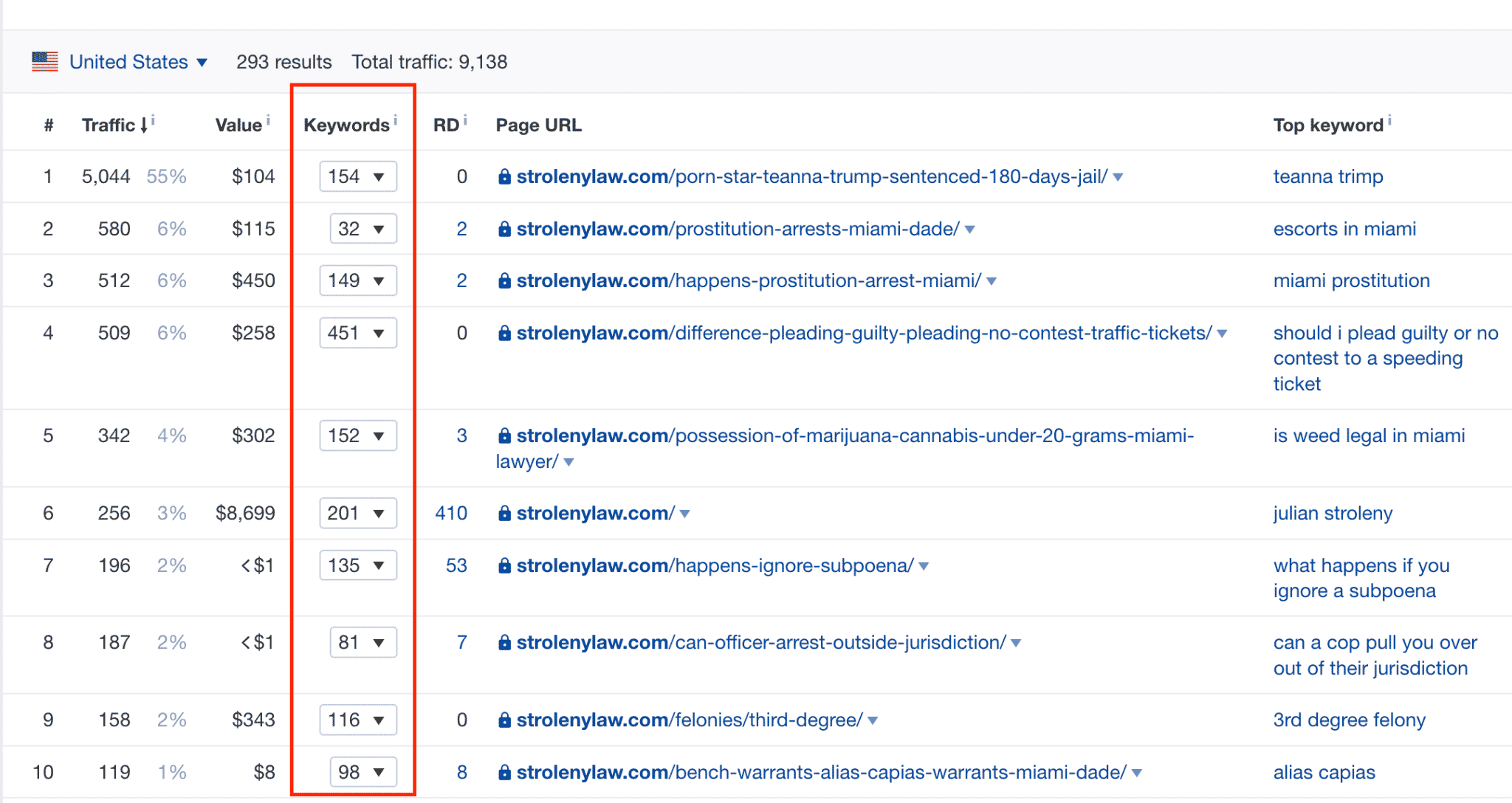
Yep, a single page can rank for hundreds or even thousands of keywords!
You need to identify low competition keywords that have business value and send you your ideal customers. To guide your keyword search, the Ahrefs tutorial below can help:
Craft high quality content hubs (to establish your topical authority)
Google wants to serve quality content in its search results to satisfy user intent. To achieve the same, focusing on using a “string of keywords” isn’t enough — understanding the actual content is important.
So in 2012, Google introduced the Knowledge Graph, shifting its focus towards “things, not strings.” Since then, Google has introduced many machine learning algorithms, including the Hummingbird update, RankBrain, and BERT.
Hence Google’s semantic search engine has started rewarding websites that create hubs of content around a core subject.
As I showed in the personal injury marketing piece, for one of our clients, we created 15k words of such high-quality content around their law practice areas:
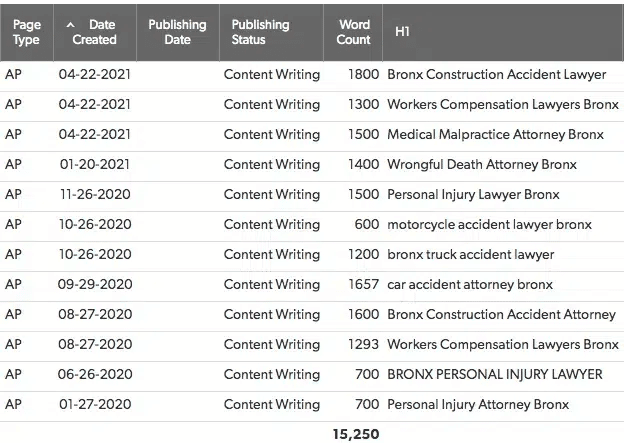
Then we neatly organized their hubs around their practice areas:

And this has resulted in their website ranking for a bunch of Bronx keywords related to accidents:
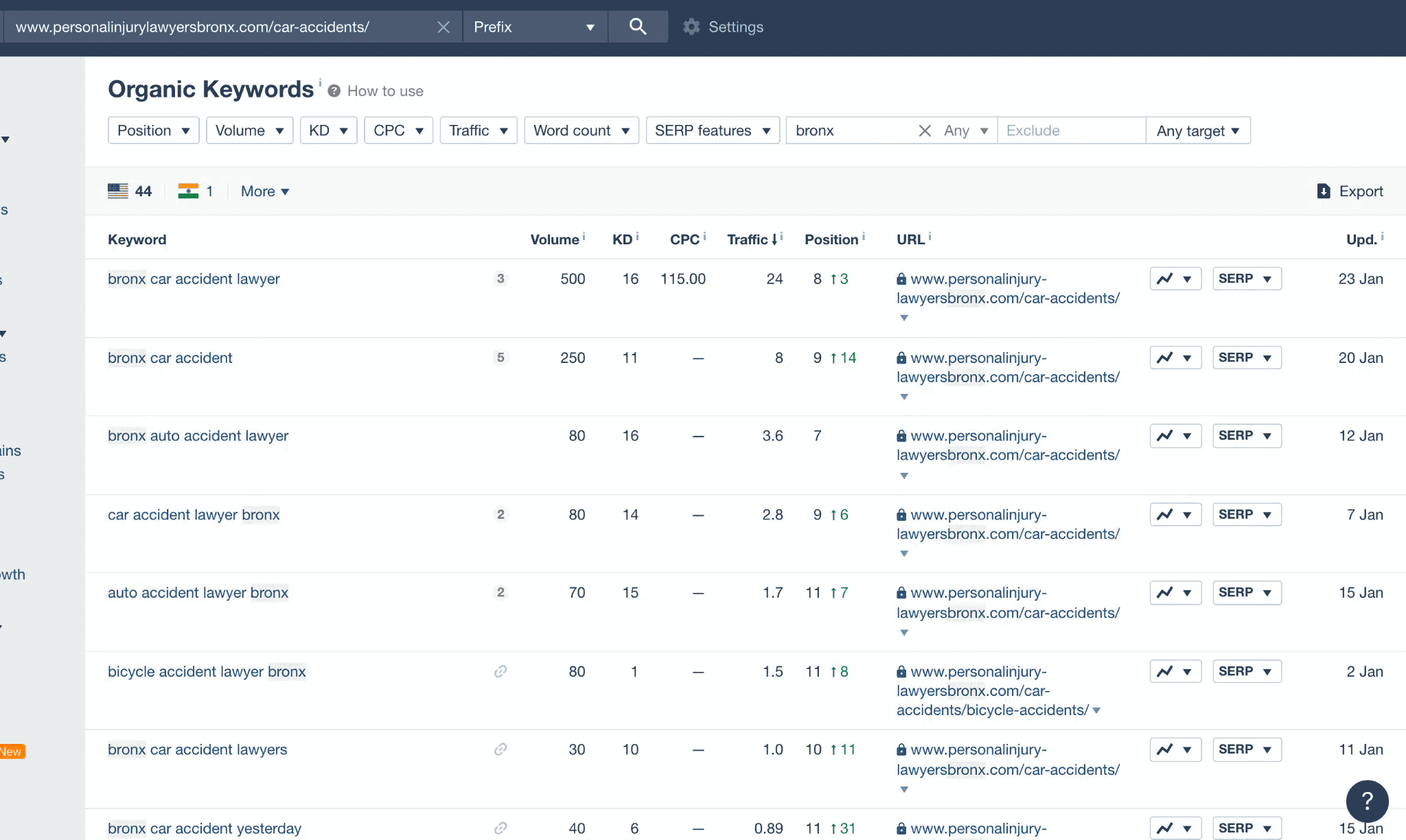
Want to see similar results by creating a content hub for your new website?
Then here’s a Hubspot tutorial on how to create an effective cluster and pillar page:
Scale your link building efforts
Link building is the holy grail of any SEO strategy. It can significantly cut the time you take to rank in Google, especially if you’re just starting to pursue SEO. However, you need to create a smart link acquisition strategy that distributes link building across your whole website and content hubs.
For one of our clients, 1800.injured, we saw they were stuck on page 2 for an important keyword they wanted to rank for:
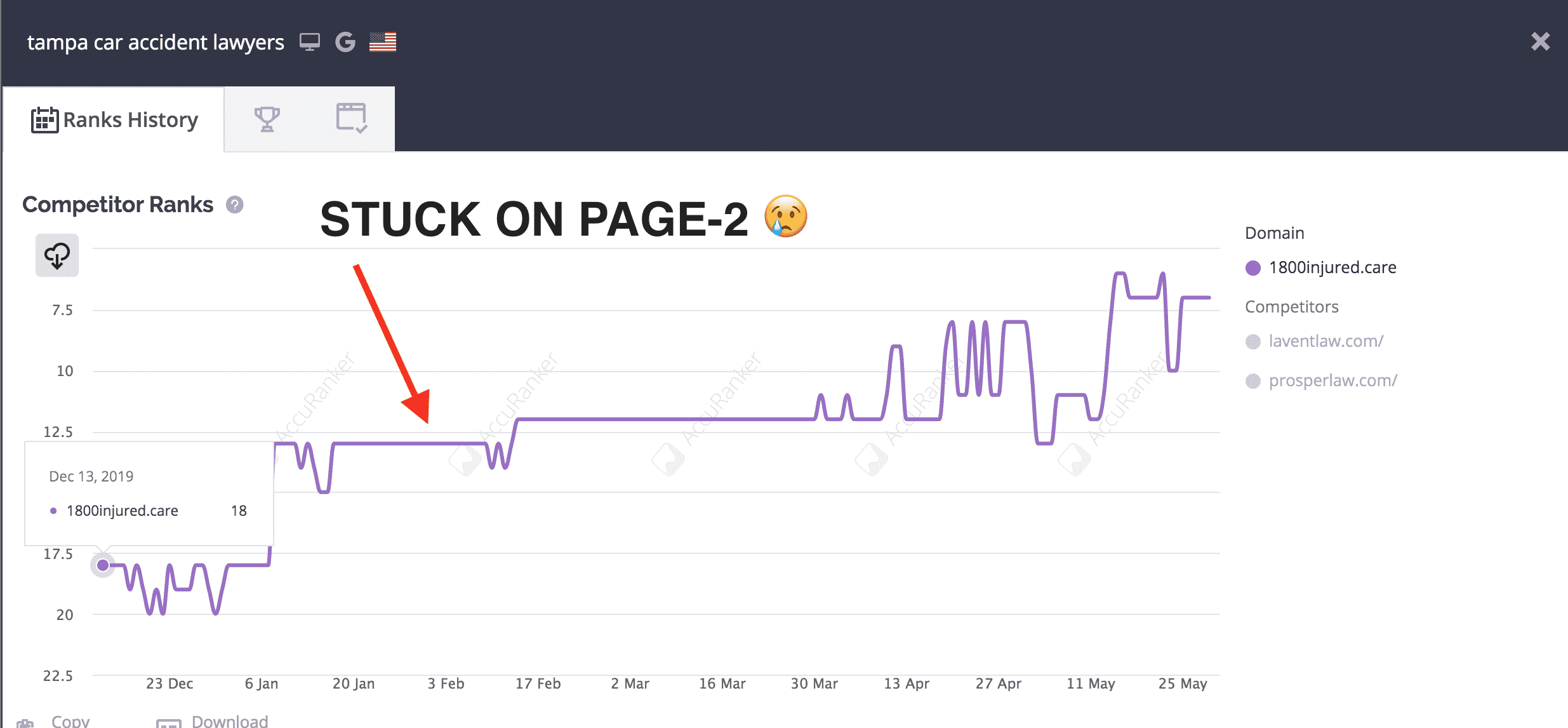
We tried link building on this page exclusively:

But it didn’t work, despite our metrics in Ahrefs (domain rating and referring domains) being better than pages in a higher ranking position:

Then we pursued link building across the whole silo we had published for their website, which included other accident attorney pages:
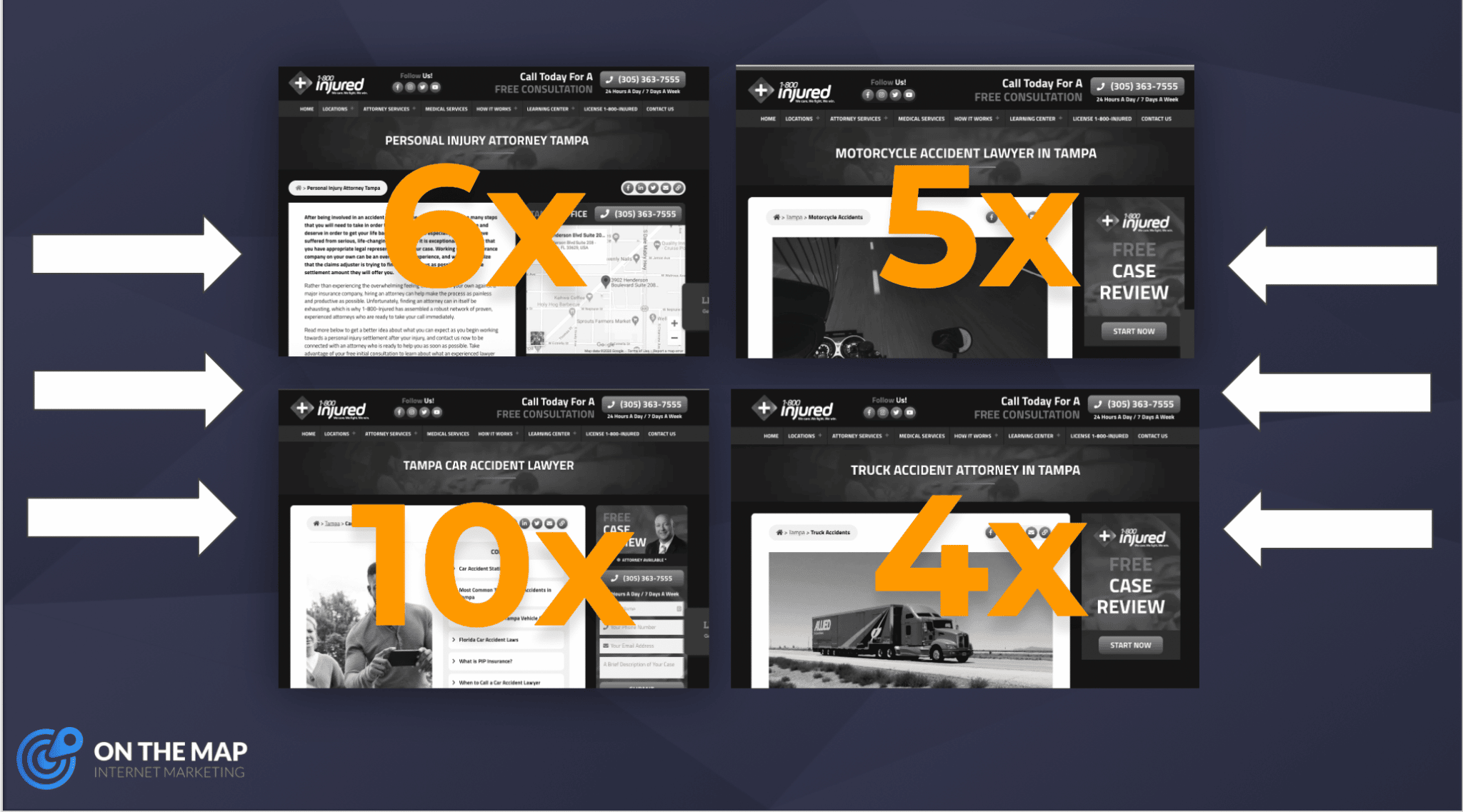
The result?
Our pages ranked better across the board:
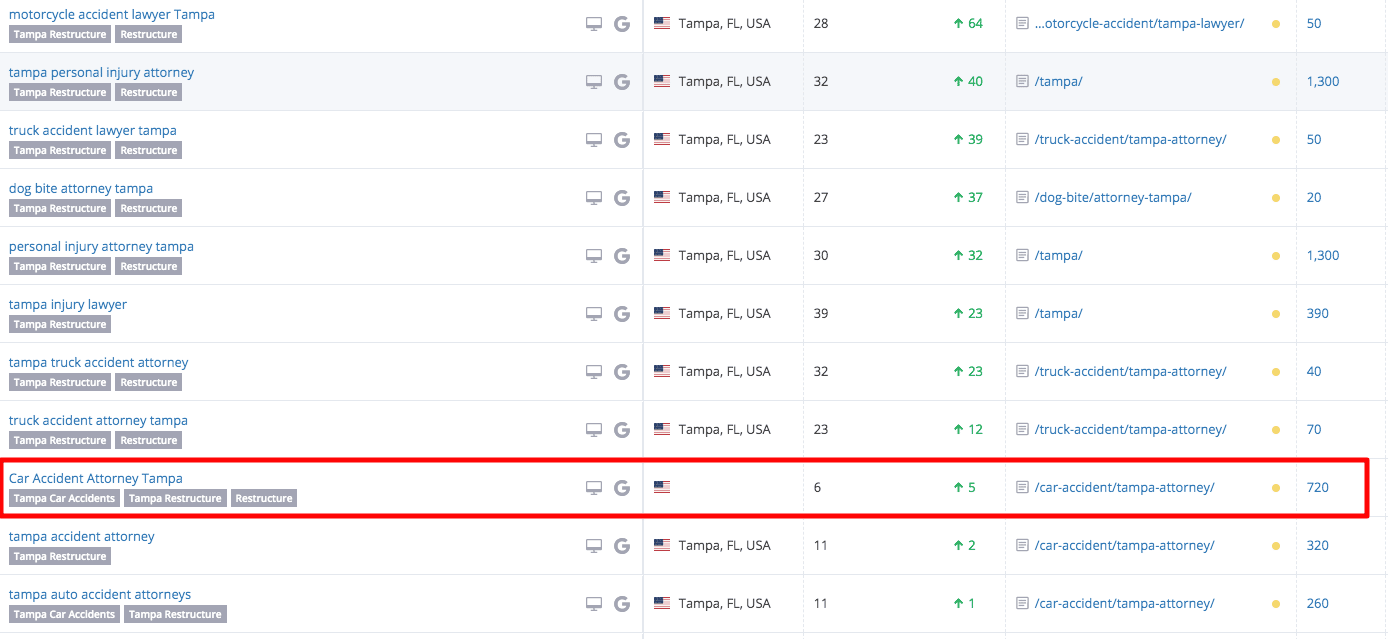
If you want to take your link building to the next level and rank faster, I recommend conducting a granular link gap analysis.
Our SEM product head, Kevin Cook, recommends to:
- Find sites that have topical relevance, traffic, a decent DR,
- Look at do-follow vs. no-follow links,
- Analyze anchor text ratios.
Here’s a sample link gap analysis that he does for every SEO client we onboard:
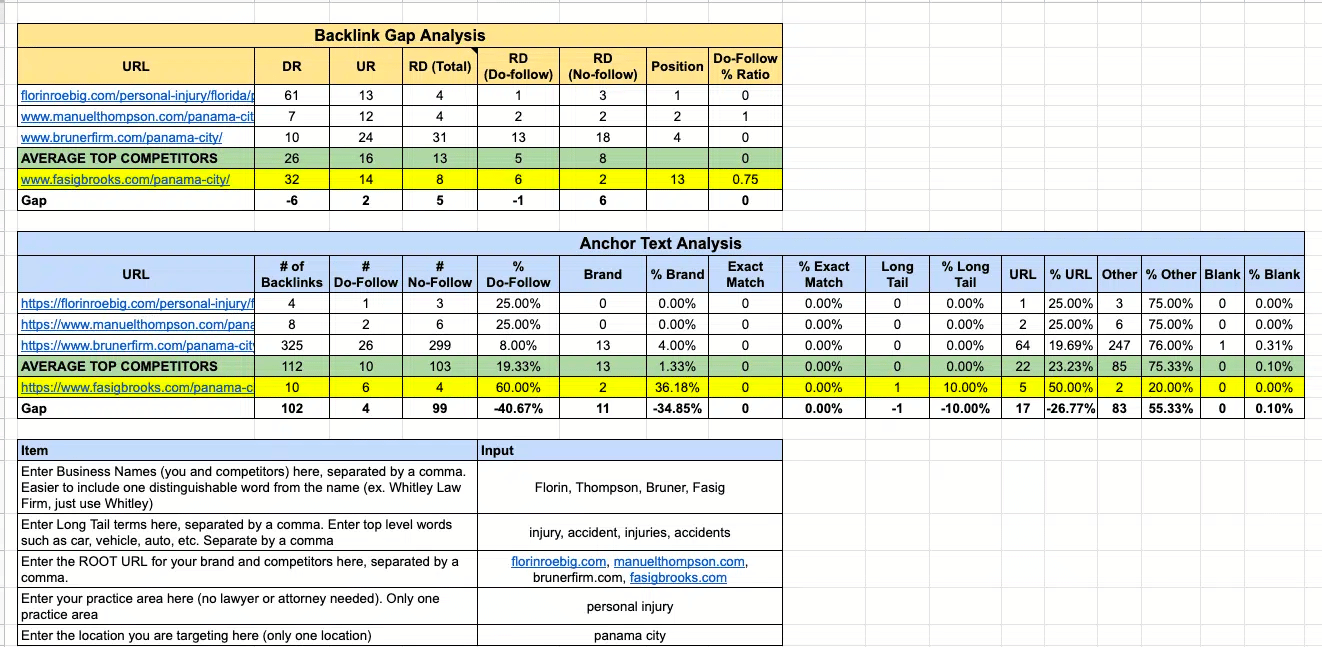
Then plan your link building efforts around your findings above to integrate personalized outreach, guest posting, and other tactics.
Dissect the current top ranking pages and find the areas where you lack
All the pages that rank in Google have a variety of aspects going right for them at a page and domain level. While the three factors above are great starting points, there’s nothing better than a manual audit of the search engine results page (SERP).
So plug the keyword you want to rank for, then use tools like Ahrefs and Google PageSpeed Insights to evaluate what makes the domain rank. Sometimes changing something as simple as page titles (or adding internal links) can get Google to rank your website.
PS: While all of the above are important aspects of an SEO strategy, don’t forget the basics. Claim your website in the Google search console and submit a sitemap. Then ensure your pages are crawlable and your site’s content readable by search engines.
So how long does it take to rank on Google?
Merely 22% of pages that ranked in the top10 (in the Ahrefs study of 2M results) were created within the first year. Old pages dominate Google rankings, but link building and writing relevant content can help you rank faster.
Want to get higher rankings without lifting a finger? We can get your website to start ranking ASAP! Contact us to get access to an expert digital marketing consultant from our team.
Table of Contents
Related Articles
Dominate Your Market with Digital Marketing Services That Deliver
Talk to a certified professional today, and we will design a strategy specific to your case.






